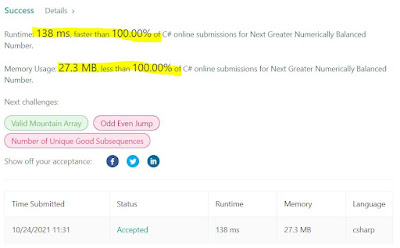Numerically Balanced: brute-force, still fast
Nothing really special about problem solved 938th, as a matter of fact, this one got lots of negative votes because honestly, it isn't that cool indeed.
Create a function to check whether a number is numerically balanced. Some simple calculation, and you can do it in constant time (like O(10)...). Then, keep going from n+1 to oo, until you find a balanced number. Return it. Pretty boring. Code is below fellas, cheers, ACC.
2048. Next Greater Numerically Balanced Number
Medium
An integer x is numerically balanced if for every digit d in the number x, there are exactly d occurrences of that digit in x.
Given an integer n, return the smallest numerically balanced number strictly greater than n.
Example 1:
Input: n = 1 Output: 22 Explanation: 22 is numerically balanced since: - The digit 2 occurs 2 times. It is also the smallest numerically balanced number strictly greater than 1.
Example 2:
Input: n = 1000 Output: 1333 Explanation: 1333 is numerically balanced since: - The digit 1 occurs 1 time. - The digit 3 occurs 3 times. It is also the smallest numerically balanced number strictly greater than 1000. Note that 1022 cannot be the answer because 0 appeared more than 0 times.
Example 3:
Input: n = 3000 Output: 3133 Explanation: 3133 is numerically balanced since: - The digit 1 occurs 1 time. - The digit 3 occurs 3 times. It is also the smallest numerically balanced number strictly greater than 3000.
Constraints:
0 <= n <= 106
public int NextBeautifulNumber(int n)
{
for (long i = n + 1; i < Int32.MaxValue; i++)
{
if (IsNumericallyBalanced(i)) return (int)i;
}
return -1;
}
public bool IsNumericallyBalanced(long n)
{
int[] count = new int[10];
while (n > 0)
{
int digit = (int)(n % 10);
if (digit == 0) return false;
count[digit]++;
if (count[digit] > digit) return false;
n /= 10;
}
for (int i = 0; i < 10; i++)
{
if (count[i] > 0 && count[i] != i) return false;
}
return true;
}



Comments
Post a Comment